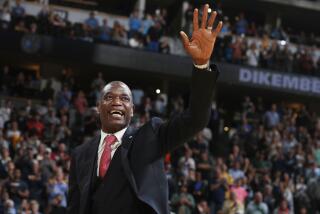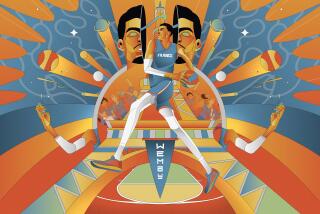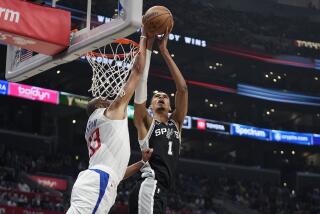Hawks’ Mutombo: Shot-Blocker, Family Man and Humanitarian
- Share via
ATLANTA — There are many sides to this giant man, which isn’t surprising when you consider his name:
Dikembe Mutombo Mpolondo Mukamba Jean Jacque Wamutombo.
He’s a humanitarian, but he’s not above whining to get his way. He’s an elegant shot-blocker, but he seems quite awkward at the other end of the court. He’s a family man, but some opponents have called him a dirty player. He’s domineering, yet down home.
“He’s a big guy with a loud voice,” said Tyrone Corbin, Mutombo’s teammate with the Atlanta Hawks. “That intimidates a lot of people. But he’s a very caring guy. He’s very proud of who he is, what he’s trying to accomplish and where he’s going.”
When having a courtside discussion with Mutombo, there are many subjects to cover.
He might talk about his burning desire to win an NBA championship, which seems unlikely this season with the Hawks trailing New York 2-0 in a second-round series that continues today at Madison Square Garden. Or he might give a discourse on the civil strife in his beloved Africa.
If needed, he can handle the conversation in English, French, Portuguese, Spanish or one of five African dialects.
In fact, Mutombo’s concerns are so varied, his interests so widespread, his heart so large, that his coach felt compelled to issue a warning to his 7-foot-2 center.
“He has taken on some awesome responsibilities,” Lenny Wilkens said. “I told him he really needed to get his focus on his basketball. He had too many outside activities. What makes Dikembe is his basketball. If that’s good, it allows him to provide for all the other things.”
For the most part, Mutombo’s basketball has been very good since he left Denver in 1996 to sign with the Hawks. Twice, he has been named the NBA’s defensive player of the year, and he’s polished his offensive skills to the point where he’s a fairly integral part of the Atlanta offense.
But many opponents have been put off by his sharp elbows, responsible for three broken noses during the regular season and a nasty bruise to Lindsey Hunter’s eye in the first round of the playoffs.
“That’s ridiculous,” Detroit coach Alvin Gentry fumed after Hunter’s injury. “Somebody has got to do something about that.”
Wilkens defends his center on the issue of dirty play, but he’s not as supportive when it comes to Mutombo’s constant bickering about the officiating. Hardly a call is made that doesn’t draw an angry glare, a loud roar or a befuddled look.
“He’s an emotional guy, and it’s hard sometimes,” Wilkens said. “But I told him that if they’re not going to change any calls, all you get is them watching every move you make. You don’t want that.”
Off the court, Mutombo’s life is equally chaotic.
Mutombo and his wife, Rose, have a 2-year-old daughter of their own and legally adopted four of his nieces and nephews.
“They’re driving me crazy,” Mutombo said jokingly the other day, but he knew those kids would have a better chance of succeeding in America than in the family’s native Congo, a war-torn, poverty-stricken land in the center of Africa.
“Like they say in Africa, a child is raised in a village, he’s not just raised by his parents,” Mutombo said. “I have been productive in society, and I feel like I owe my community for what they have given to me. I can’t turn my back on them.”
He started a bus company to help the teeming masses get around Kinshasa, the capital city where Mutombo was born and raised. He also began a telephone company to improve the communications system.
Now, he’s trying to raise $44 million to build a new hospital in his native country. He also wants to construct a basketball arena and a school, the latter honoring his father, an education superintendent for more than three decades.
But there are so many problems, more than any one man can solve on his own. Mutombo’s deep, husky voice usually growls like a lion, but it grows as soft as a kitten when he ponders Africa’s future.
“We’re just moving in the wrong direction,” he said. “It’s not just in the Congo. It’s all of Africa. Africa has been hit these past two years by all these civil wars. Somebody has got the answer on that. I’m not the answer. But the answer is here.”
Mutombo wonders why the people of American and other Western nations were so willing to turn their attention to other problems, such as those in Kosovo, a tiny province compared with the massive African continent.
“It’s very bad to see all these wars going on in Africa, all these people dying in Africa,” he said. “But nobody is really writing about it. Nobody is paying attention to it.”
The Congolese conflict became especially personal for Mutombo last summer. His mother died after being denied medical care by the warring factions.
When Mutombo was single, his mother would visit the United States, cooking his meals while encouraging him to get married and have some children. Her wish finally came true, and the couple named their first child Carrie Biamba Wamutombo in honor of her grandmother.
But Mutombo’s mother died before she could see the child.
“It still bothers me a lot,” he said. “My mom didn’t get a chance to see my daughter. That’s the sad part.”
Mutombo, who will turn 33 on Tuesday, seems too busy with day-to-day life to worry about his legacy in the NBA, but he’s given it some thought.
Certainly, he’ll never achieve the same reverence as New York’s Patrick Ewing, the center who preceded him at Georgetown and is now referred to by Mutombo as “my oldest bother.” If Ewing is a smooth gemstone when he plays the game, Mutombo is an unpolished rock.
“Patrick will be Patrick, Dikembe will be Dikembe,” Mutombo said with a shrug. “I’ve always said by the time I finish playing this game, I just want people to say I was one of the greatest defensive players who ever played.”
And so much more.
More to Read
Go beyond the scoreboard
Get the latest on L.A.'s teams in the daily Sports Report newsletter.
You may occasionally receive promotional content from the Los Angeles Times.










